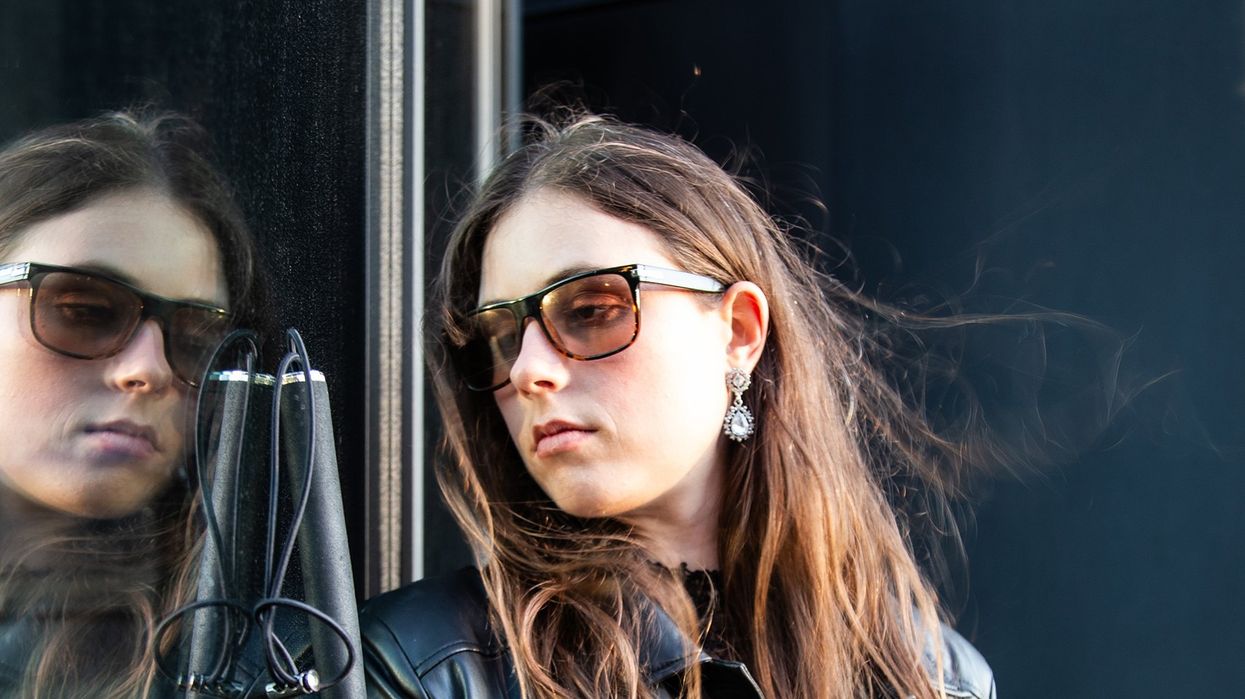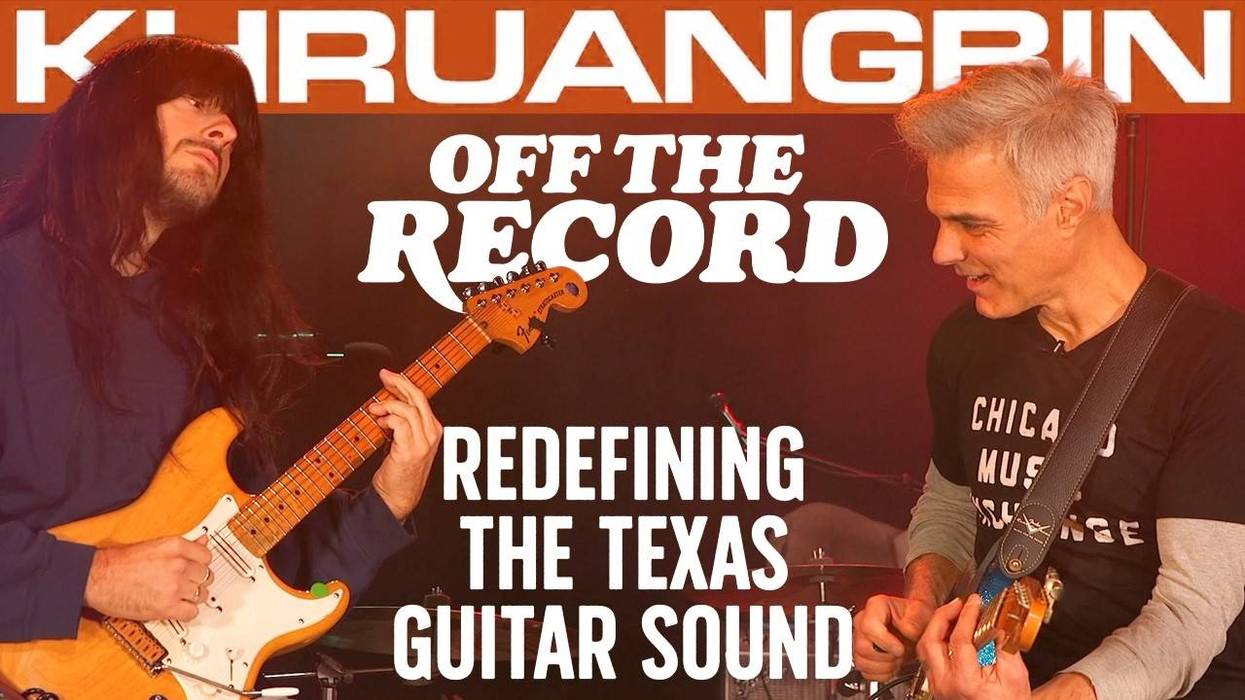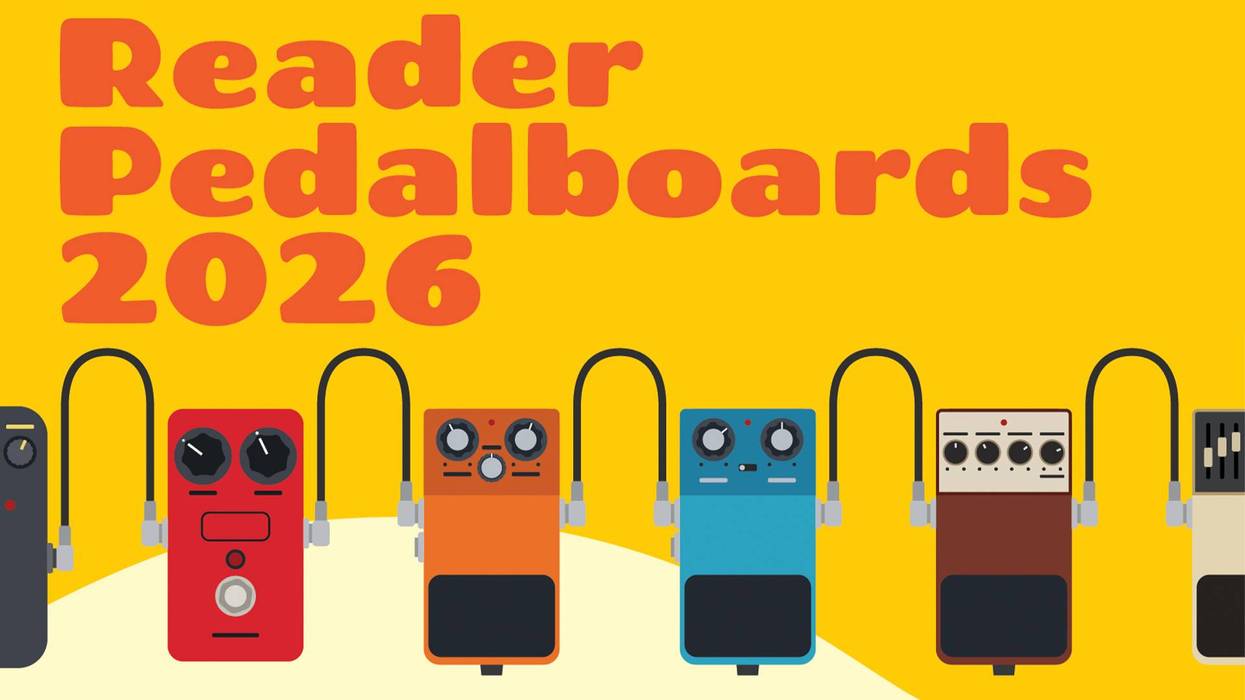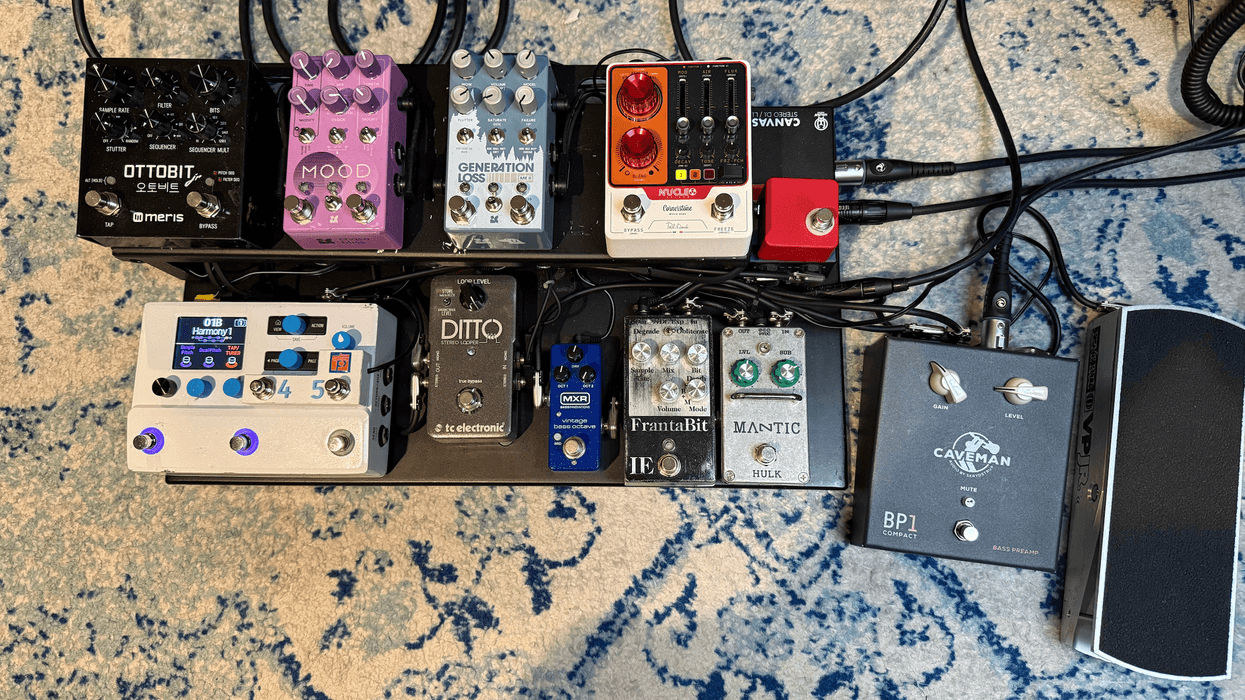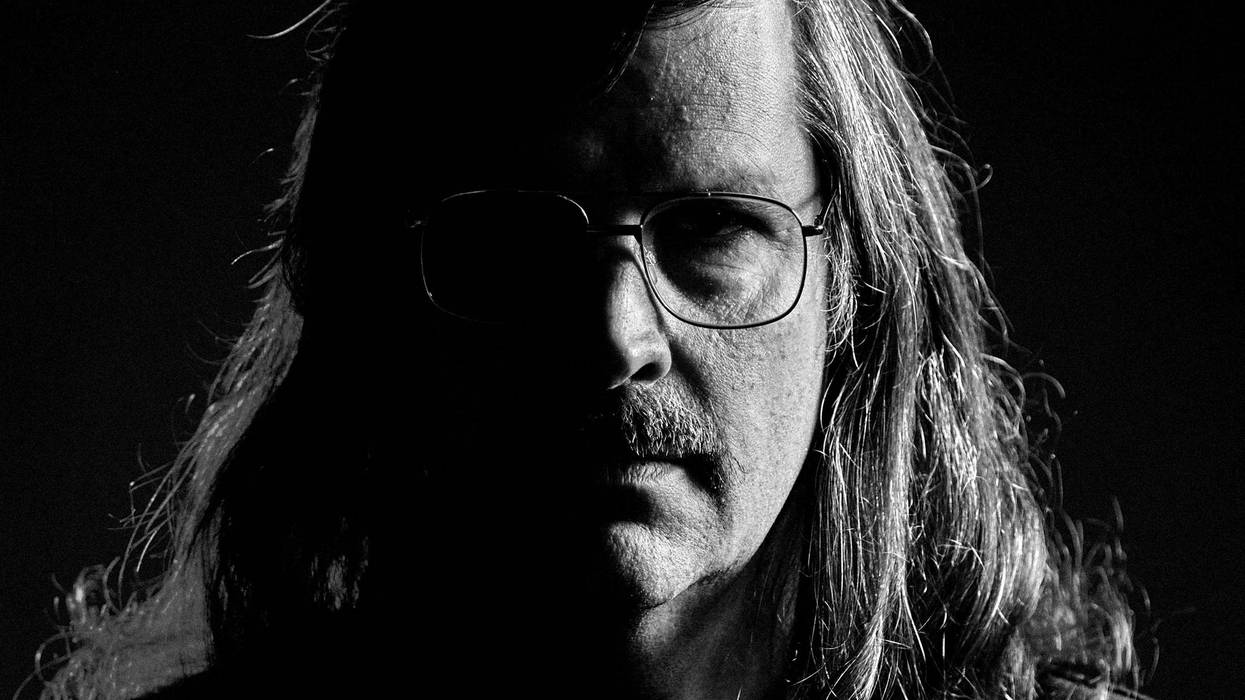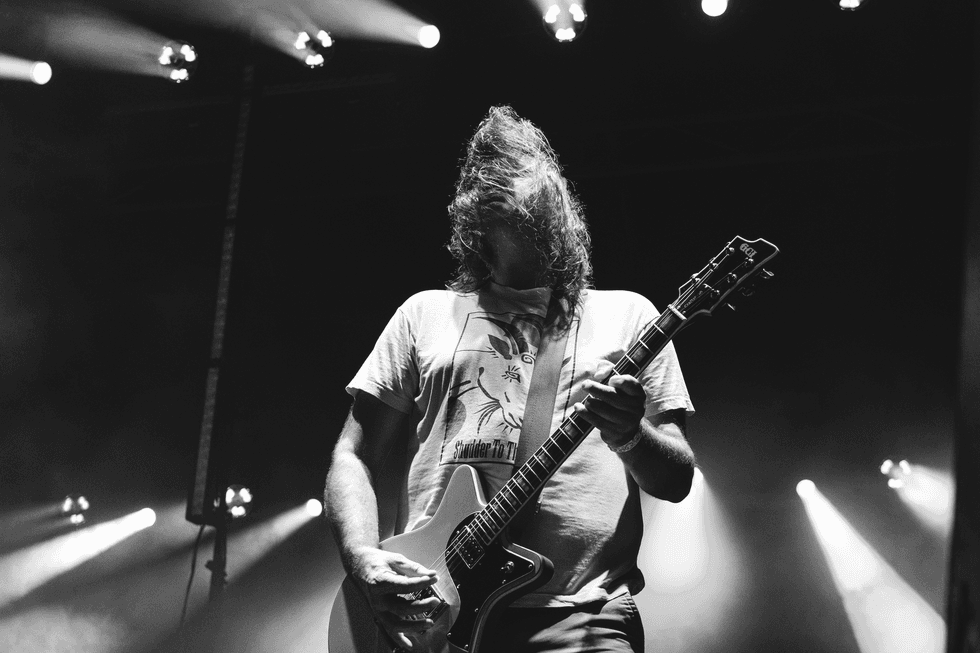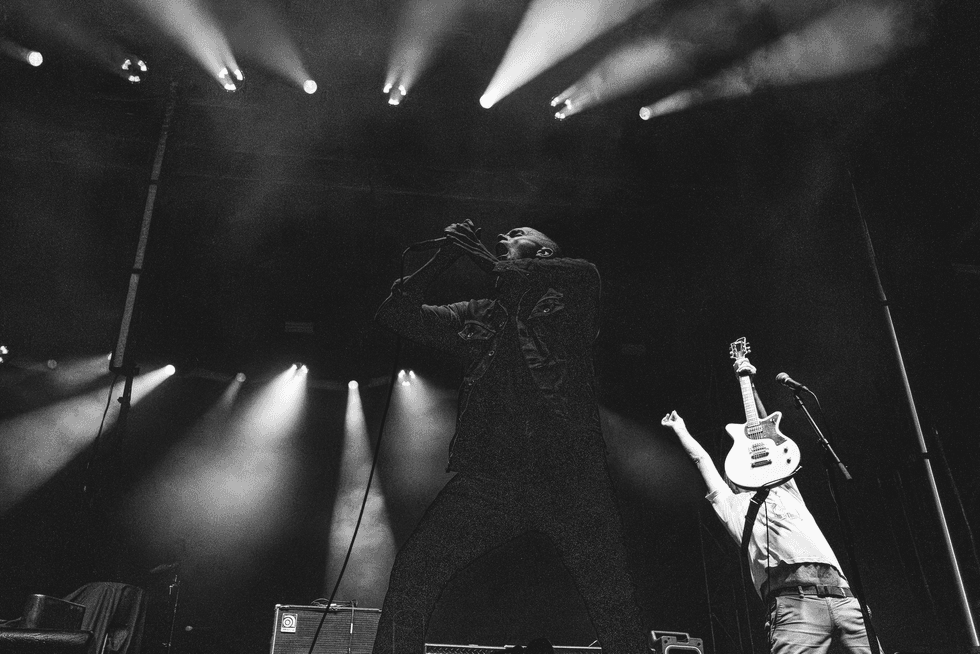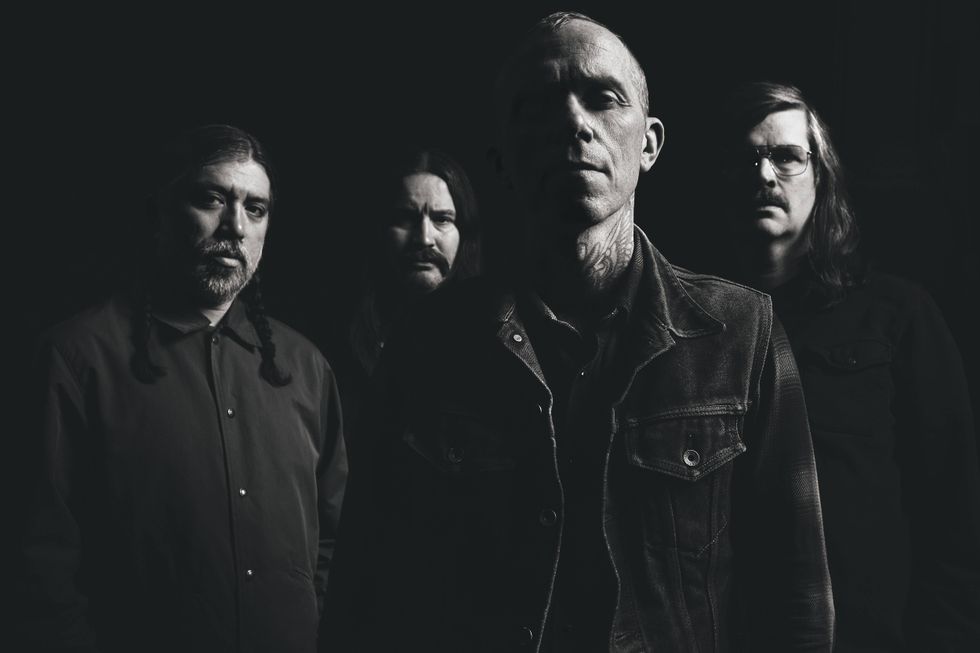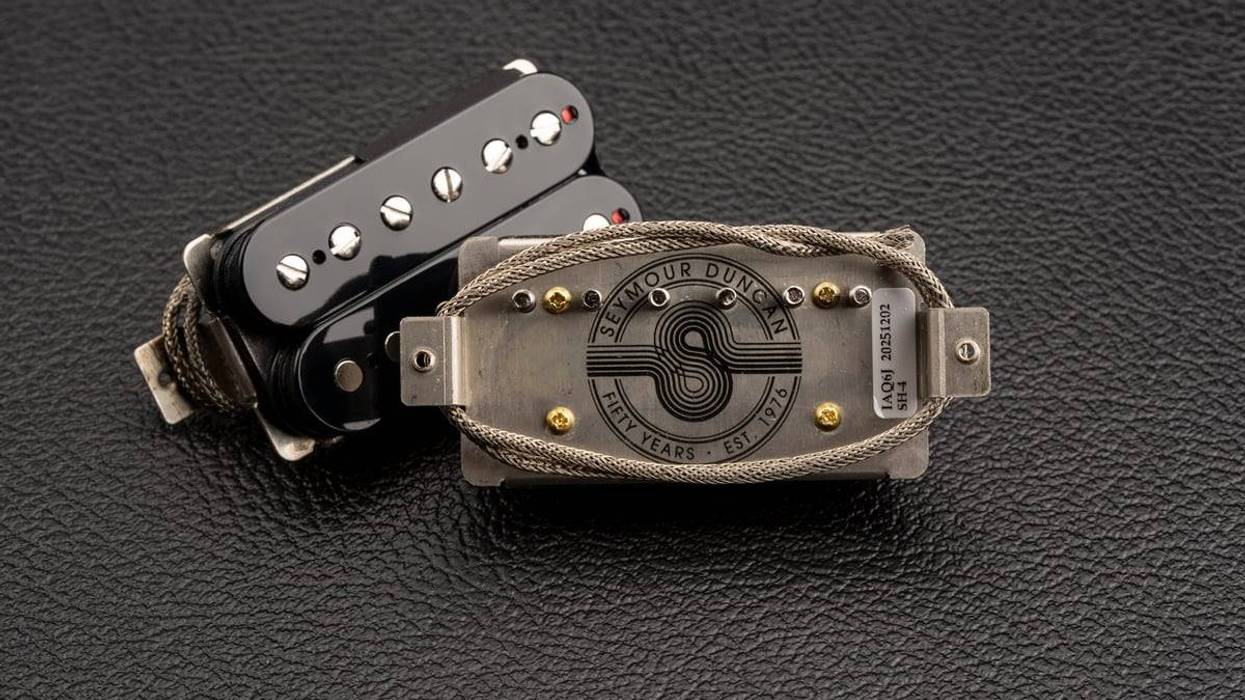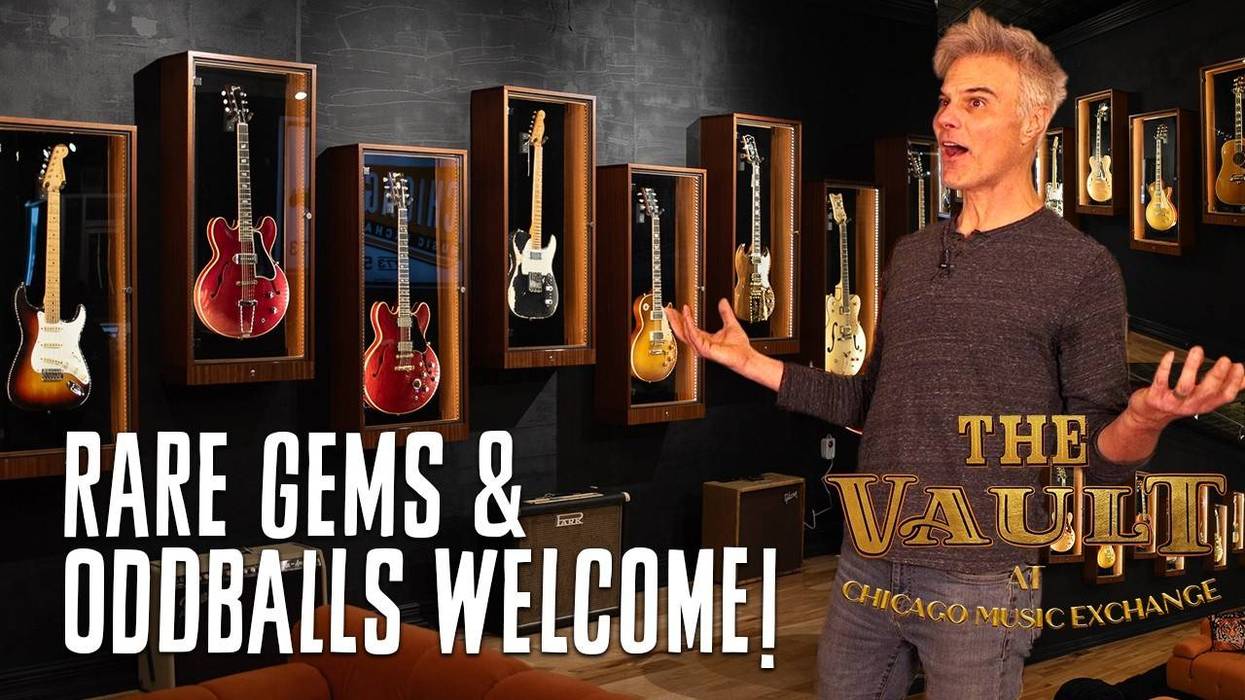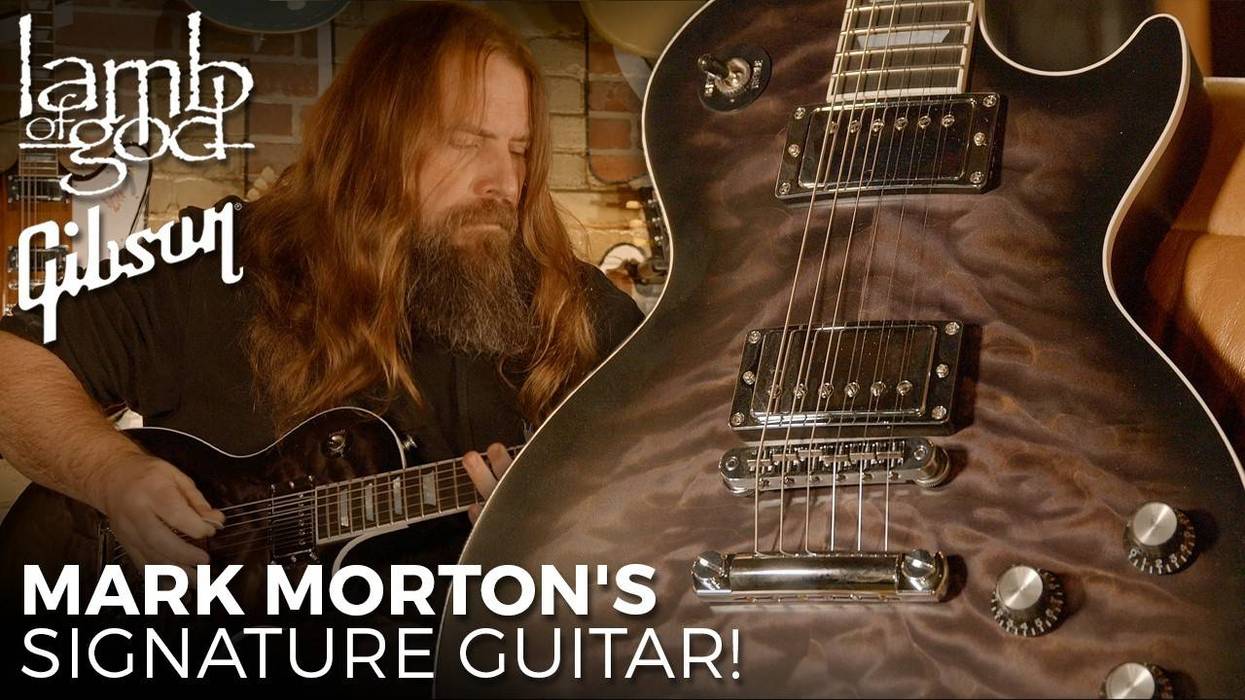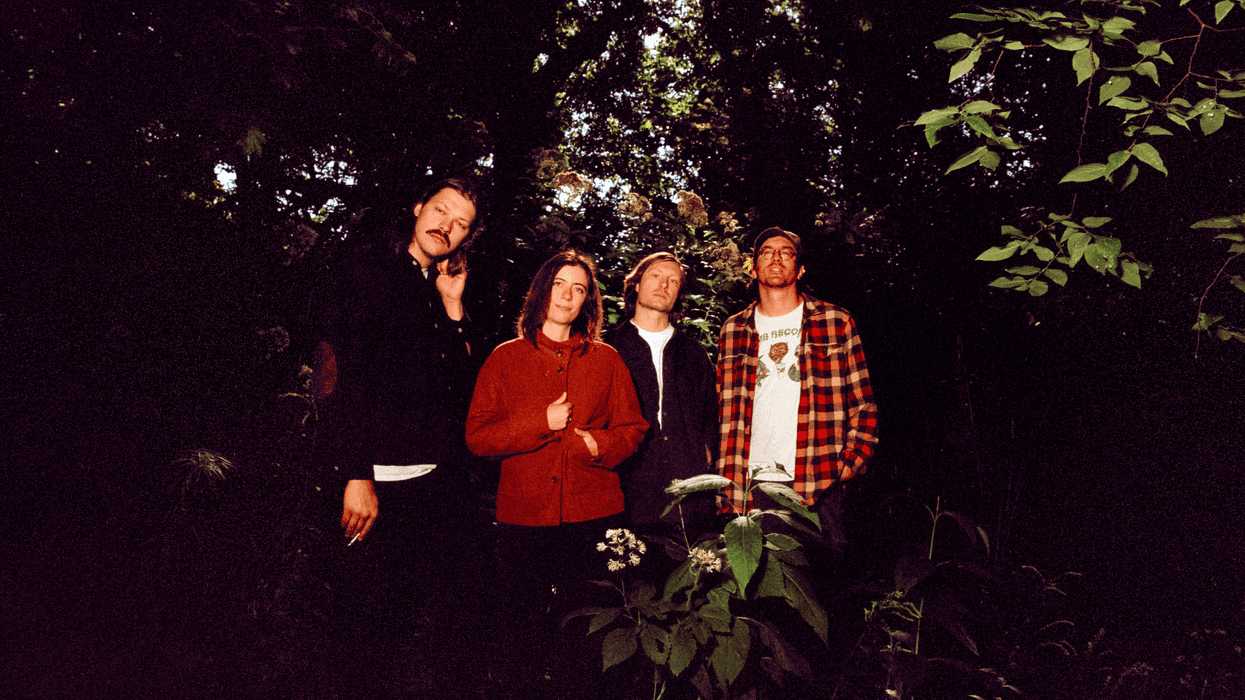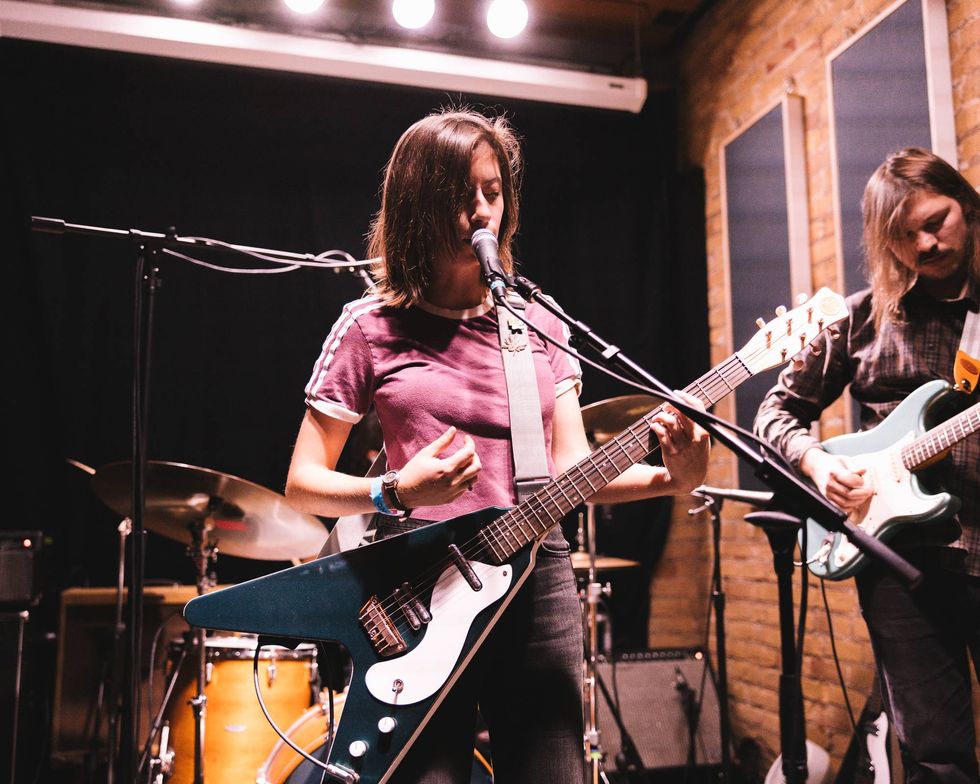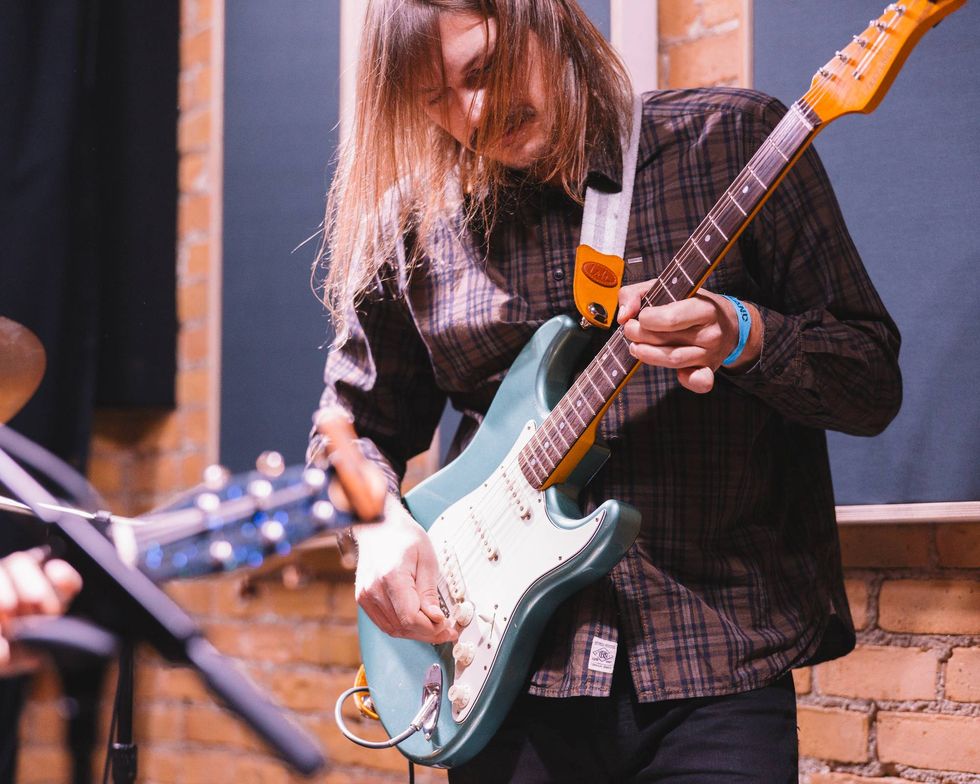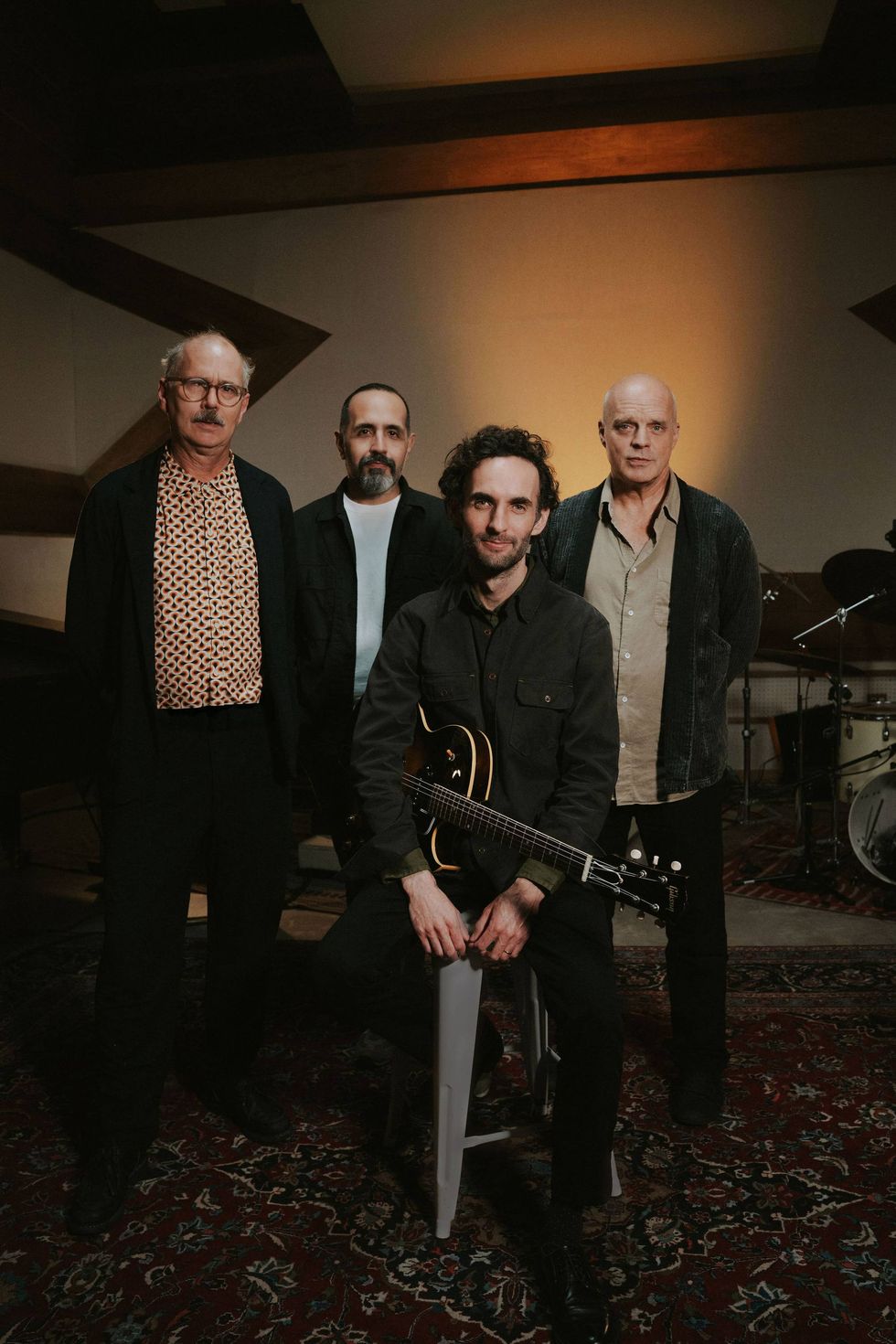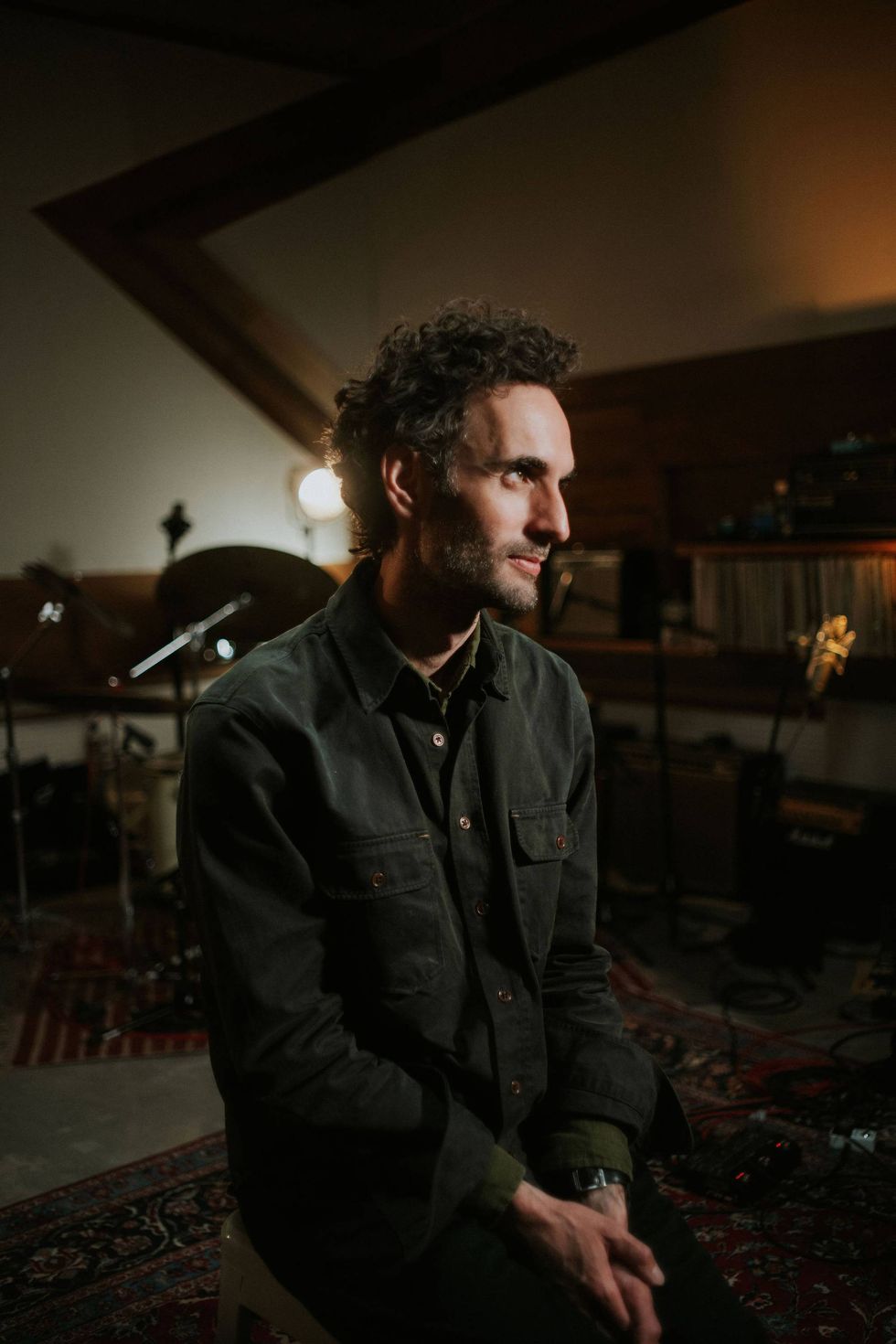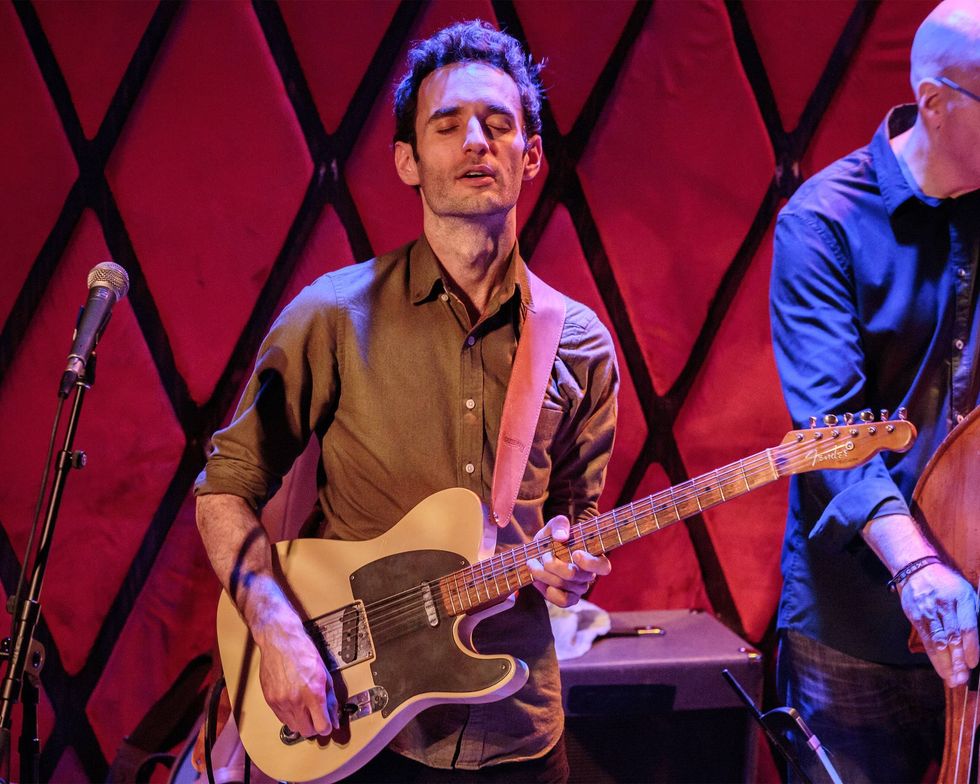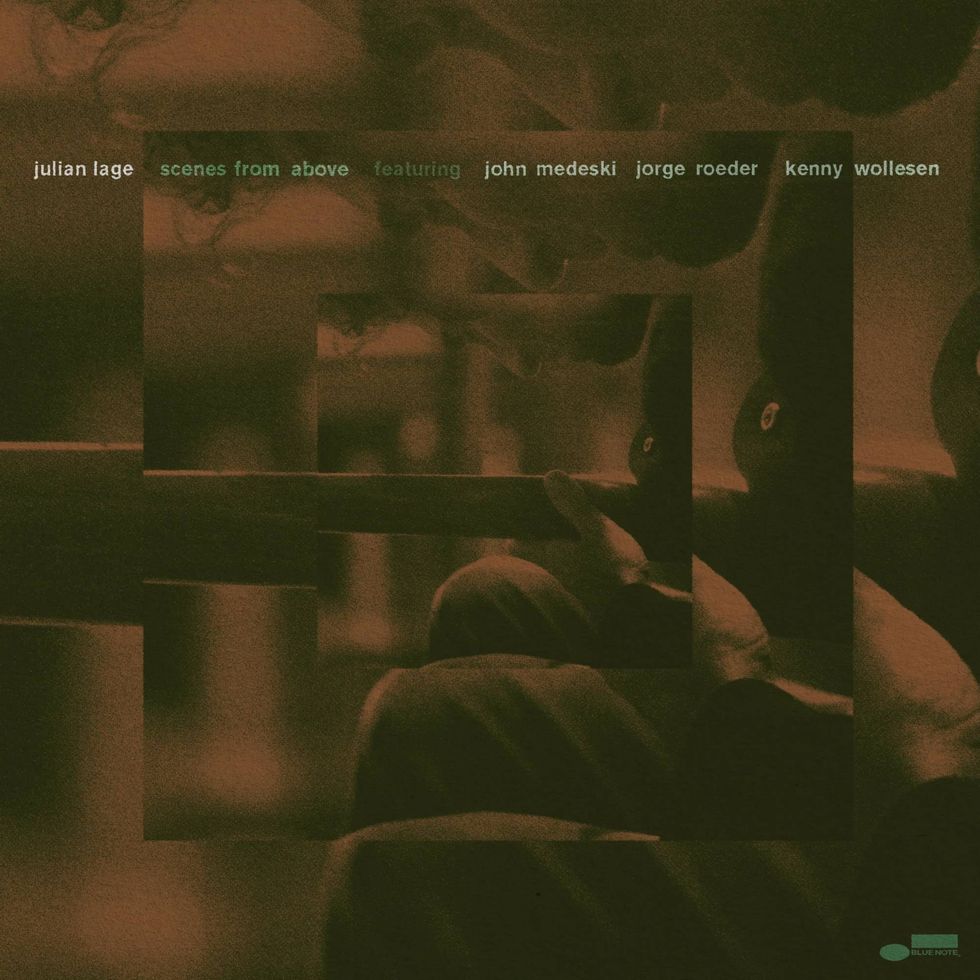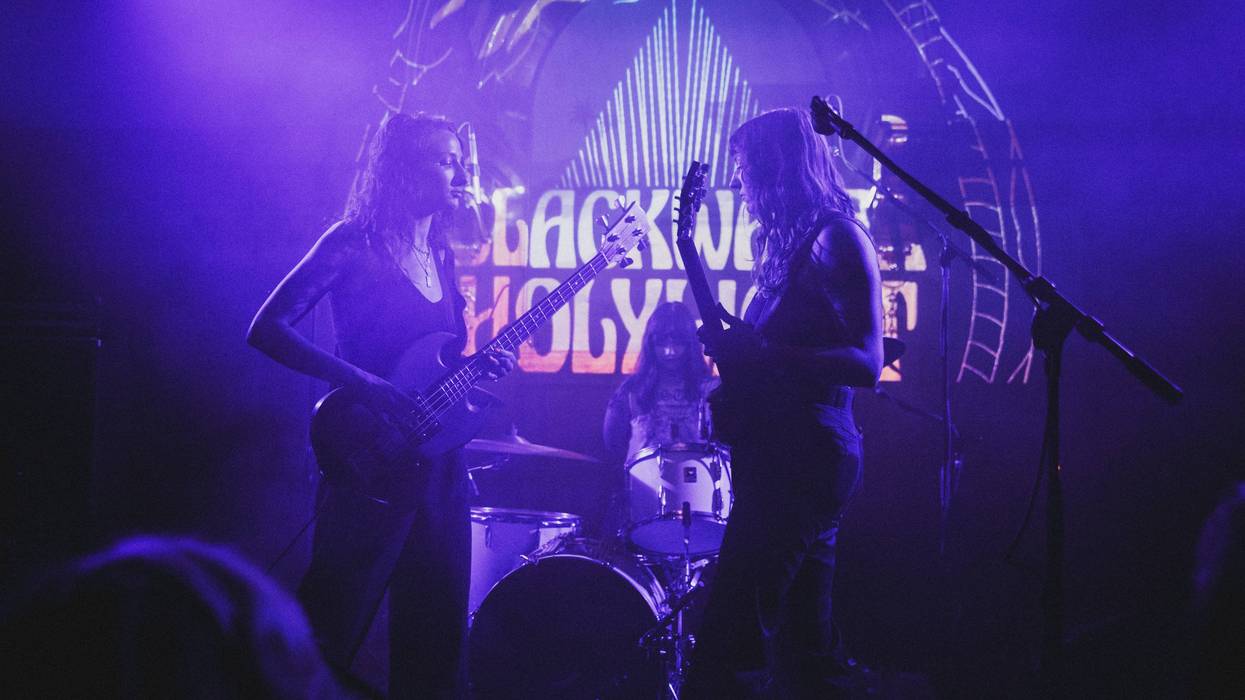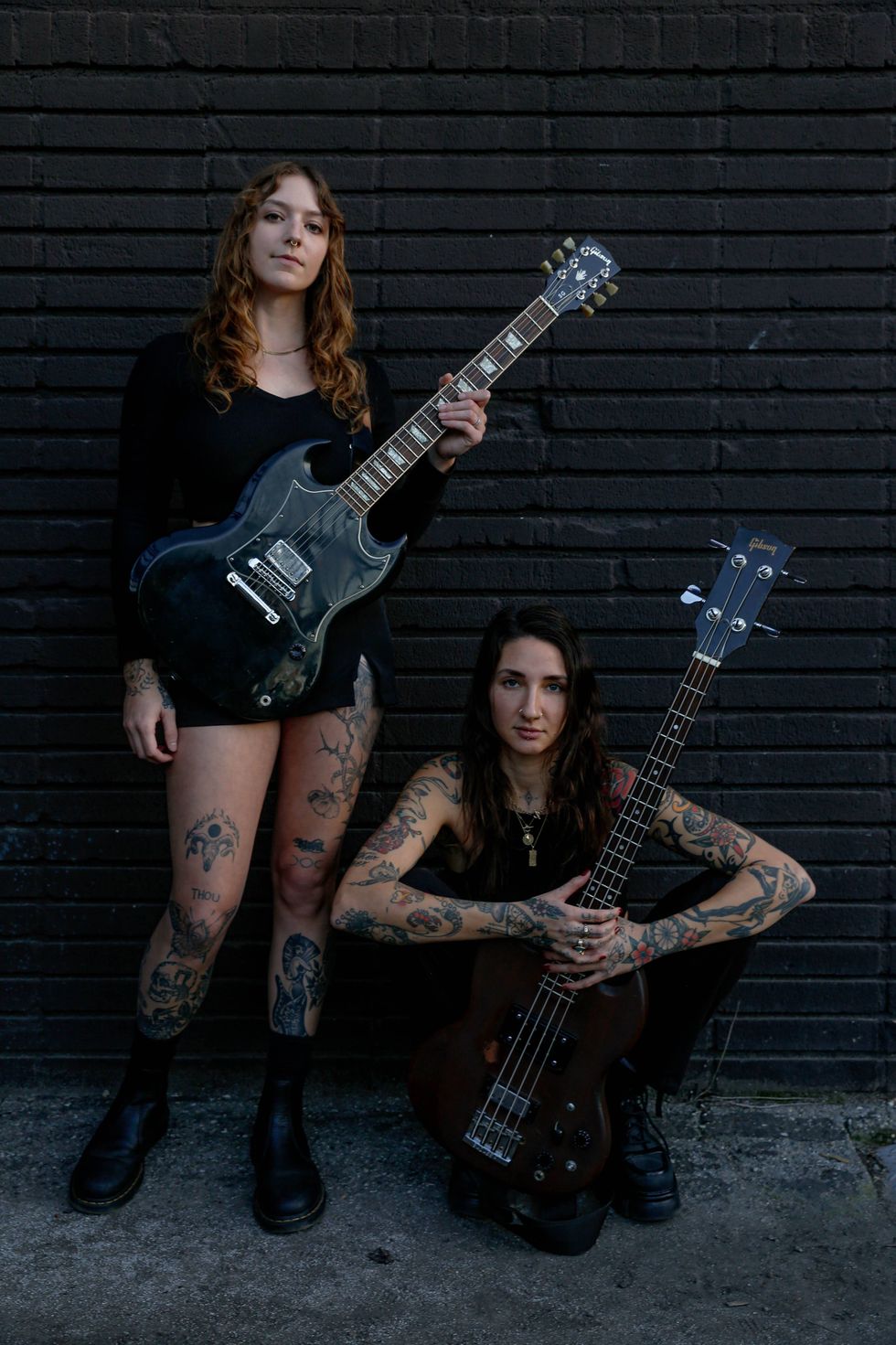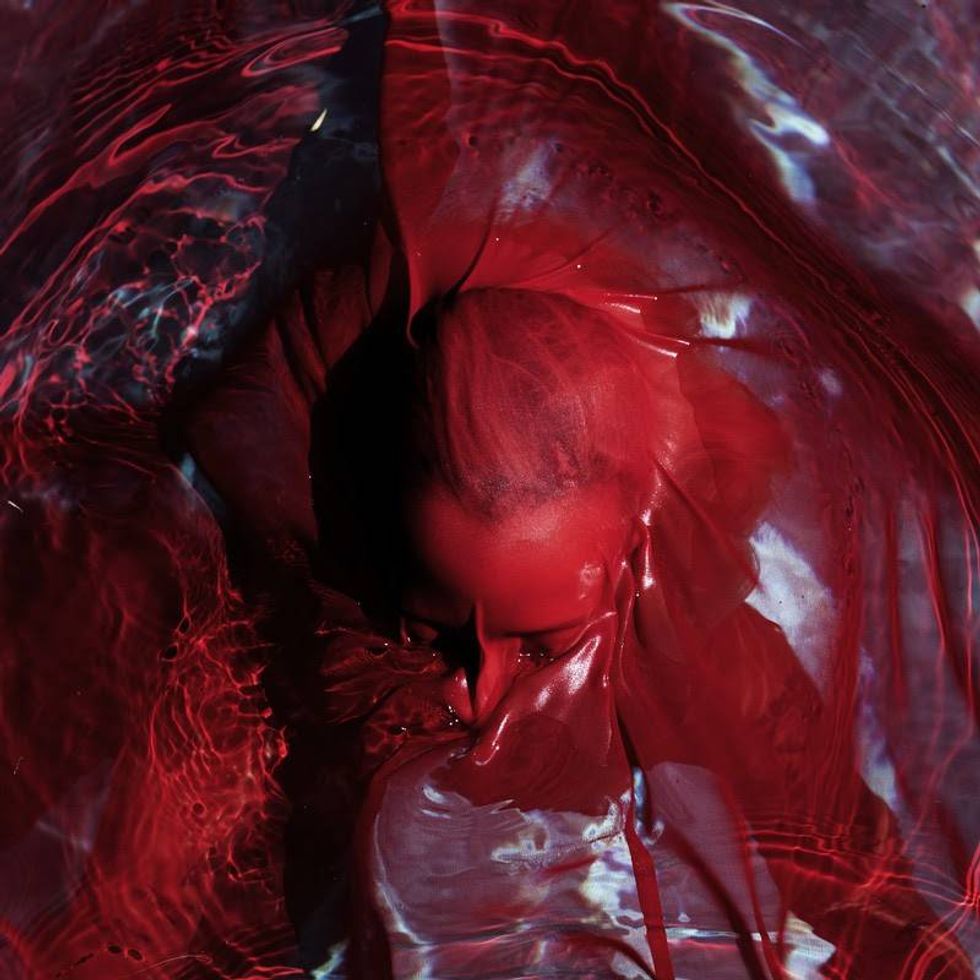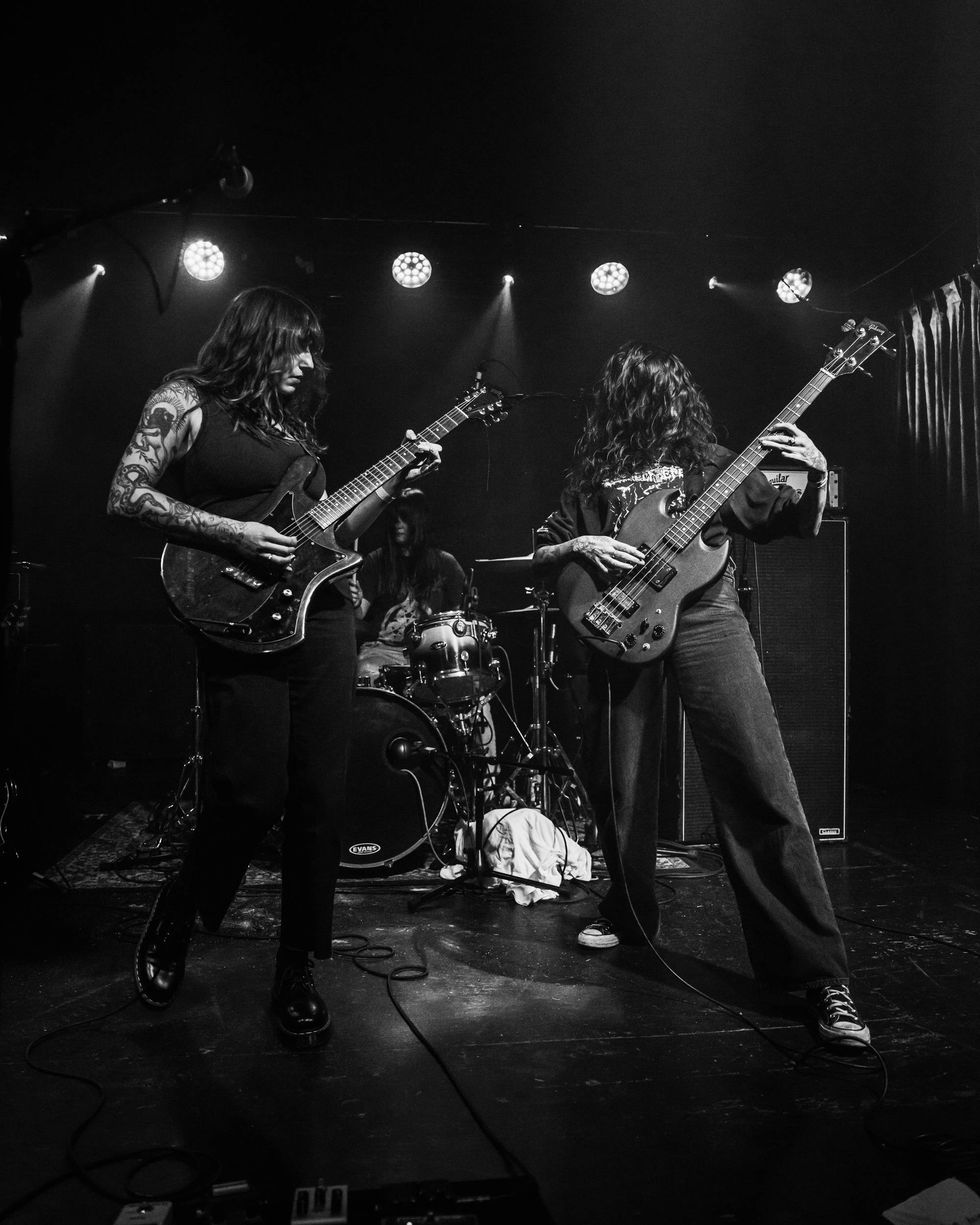Ciara Moser has a mission with her debut album, Blind. So what? The jazz-fusion bassist and composer is educating the sighted listener through her lyrics on the record, addressing a range of topics she has experienced and navigated throughout her 27 years, from spatial orientation and heightened senses to questions raised and misconceptions held about life as a blind person.
Blind. So What? was created as part of her master’s of jazz performance program at Boston’s Berklee Global Jazz Institute, where she was mentored by such esteemed musicians as Danilo Pérez, John Patitucci, Joe Lovano, and Victor Wooten. Her 6-string Fodera Emperor 6 Standard can be heard all over the record, and the title concept is front and center in the lyrics. Each song addresses a specific topic—and Moser does not mince words.
“The goal or the achievement that I’m looking for is to call for more awareness of blind people, and also, generally, for people with disabilities,” Moser says. “For me, some significant things about myself are the music that I play and being blind. It was always the question: How can I combine that? Why don’t I use my music to change what I want to change about inclusion and blindness? The Global Jazz Institute gave me the tools to actually do that through my music, because I could never connect those two elements 100 percent. Of course, I knew I already did that, standing out there publicly as a blind musician, but actually addressing the topic and writing an album about it is even more important, in my opinion.”
Ciara Moser - "Developing Senses"
Co-produced by Moser and Warren Petty, Blind. So What? begins with a cacophonous 38-second handshake, “Intro (Screen Reader),” where the words “blind, so what?” are read by computer software in 16 different languages. In the liner notes, Moser explains that it “should attract the listeners’ attention to the audible world a blind person lives in, and open up new ways of perceiving and listening.” Then, she gets into some real talk on the rest of the album, a modern jazz collection which fluidly dips and dives into funk, R&B, ambient, Latin, experimental, and, in one song, a kind of South Indian Carnatic vocal scatting called “konnakol.”
“Some significant things about myself are the music that I play and being blind. It was always the question: How can I combine that?”
Moser doesn’t sing lead on any of the songs (although she does some spoken word, including the album’s improvised finale, “The Lady with a Green Cane,” a poem by Fran Gardner). She hands that task over to best friend and fellow Berklee student Aditi Malhotra on a half-dozen songs, while Nishant Shekar, another close friend and member of the Berklee Indian Ensemble, sings the first single, the funky, R&B-tinged jazz number “I Trust,” which begins with this instruction of sorts: “Imagine how it is to live in a world that you can’t see / Relying on someone else’s helping hand, following every step, every turn, every move that’s made / Trust in your friends and family.”
But what follows is even more direct. “Disability is a stamp they put on us / I am a person like you / But you still treat me like I’m some kind of different thing,” Moser writes for the song “Different Ability, Pt. 1.” In the percussive “Memory,” for which she won a 2023 Herb Alpert Young Jazz Composers award, Moser explains her musical process: “I am memorizing every bit and piece of each song / For playing everything with discipline, concentration / I save it to my hard drive and use my memory to find the way through all the pieces I play.” That’s the actual lyric.
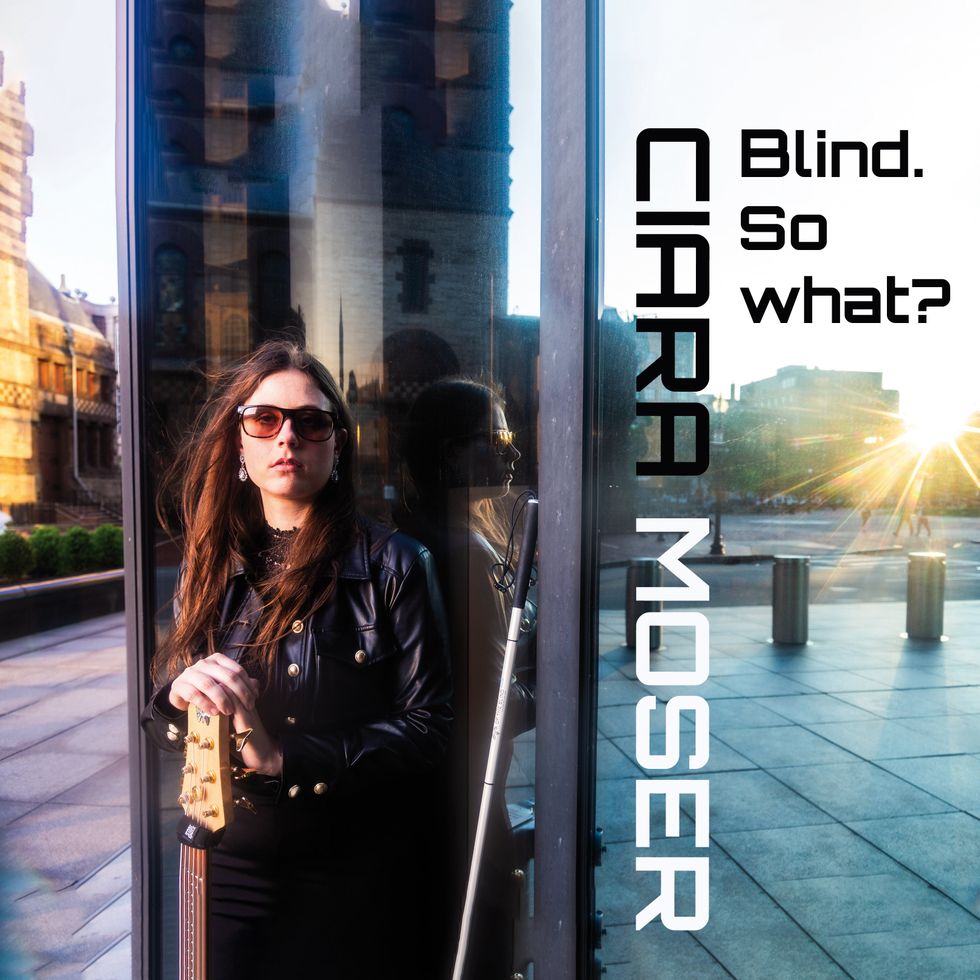
On her debut record Blind. So What?, virtuoso Ciara Moser dazzles with spectacular bass performances and striking lyrics about her life experience.
It’s an atypical approach to songwriting, and even more so for jazz, a style of music that often envelops you. Moser’s lyrics pull you out of that reverie, offering an opportunity to actively listen and learn.
“Obviously, a lot of those topics that I chose are from the viewpoint of a blind person who grew up in a very sighted society,” says Moser. “But still, even if you grew up around a lot of blind people, you’re still in this sighted society that’s built for sighted people. So every topic is related to that.”
“Even if you grew up around a lot of blind people, you’re still in this sighted society that’s built for sighted people.”
The title of the album is something Moser has felt for years. She created a podcast of the same name, in which she talks frankly about everything from how she does her makeup, to how she knows when she has her period, to how she keeps her place tidy.
“My dad and I, and my brothers and my mom, we were always talking about creating this movie called ‘Blind. So What?,’ about our family. [It would be] a documentary, because it’s kind of crazy: this Irish woman marrying this Austrian, and their children—two of them are blind. And they live in Ireland first and move to Austria, where we were always the crazy family in this super small village,” Moser recounts. “Then, when I started the podcast about blindness, obviously it’s about [being] blind, so what? I still live my life normally and can do everything. It was clear that the album would be named this as well.”
Ciara Moser's Gear
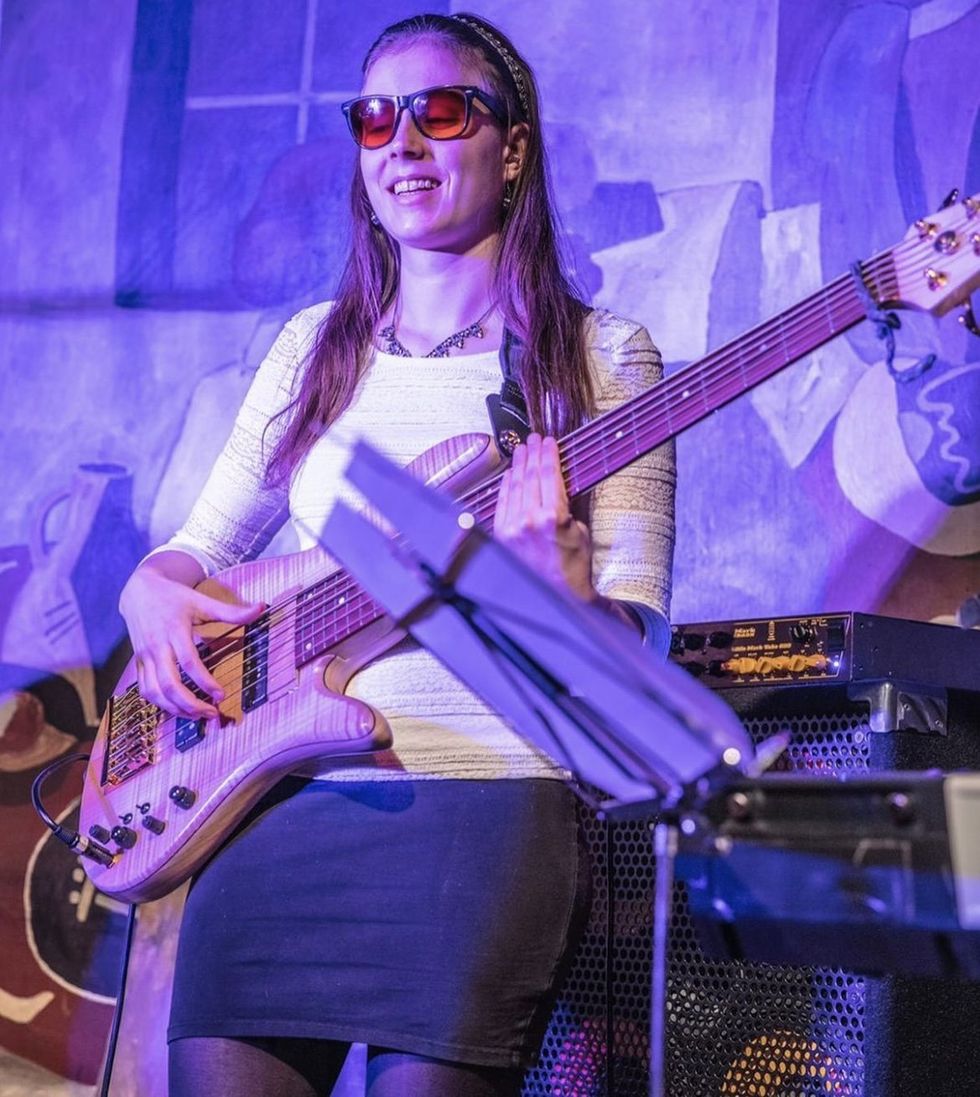
Moser’s parents started her on violin as a child, but she found her musical home when she picked up the bass.
Photo by Kaffee Siebenstern
Basses
- Fodera Emperor 6 Standard
- Fender American Elite Jazz Bass V
- Marco Marcustico
Amps
- Markbass Standard 104HR
- Markbass Traveler 121H
- Markbass Little Mark Tube 800
- Markbass Little Mark III
- Markbass Mini CMD 121P
Effects
- Zoom B6 Bass Multi-Effects Processor
- Boss DD-7 Digital Delay
- Boss AW-3 Dynamic Wah
- EHX Micro POG
- Dunlop DVP3 Volume (X)
Strings
- D’Addario NYXL32130s
Moser’s parents always instilled in her that she was just like everybody else, and her life would be no different than that of a sighted person.
“They felt music would be an important thing to help me build some skill sets as a blind child because it’s not only good for the ears, but also for motoric skills and for coordination, and for social interaction with other kids,” Moser says. “So I started learning violin when I was 2 and a half.” She played violin throughout her youth, even entering competitions, but it was with bass that Moser found a perfect fit. “For me,” she says, “the bass always had that role of being the glue.”
“They felt music would be an important thing to help me build some skill sets as a blind child.”
In her early teens, Moser played in a pop-rock band with her two brothers— her younger one is also blind—and two other friends. “It was called Blind Brats,” she laughs. Her first bass was a “super cheap” Ibanez, and an instructor would come to the family home to give her lessons.
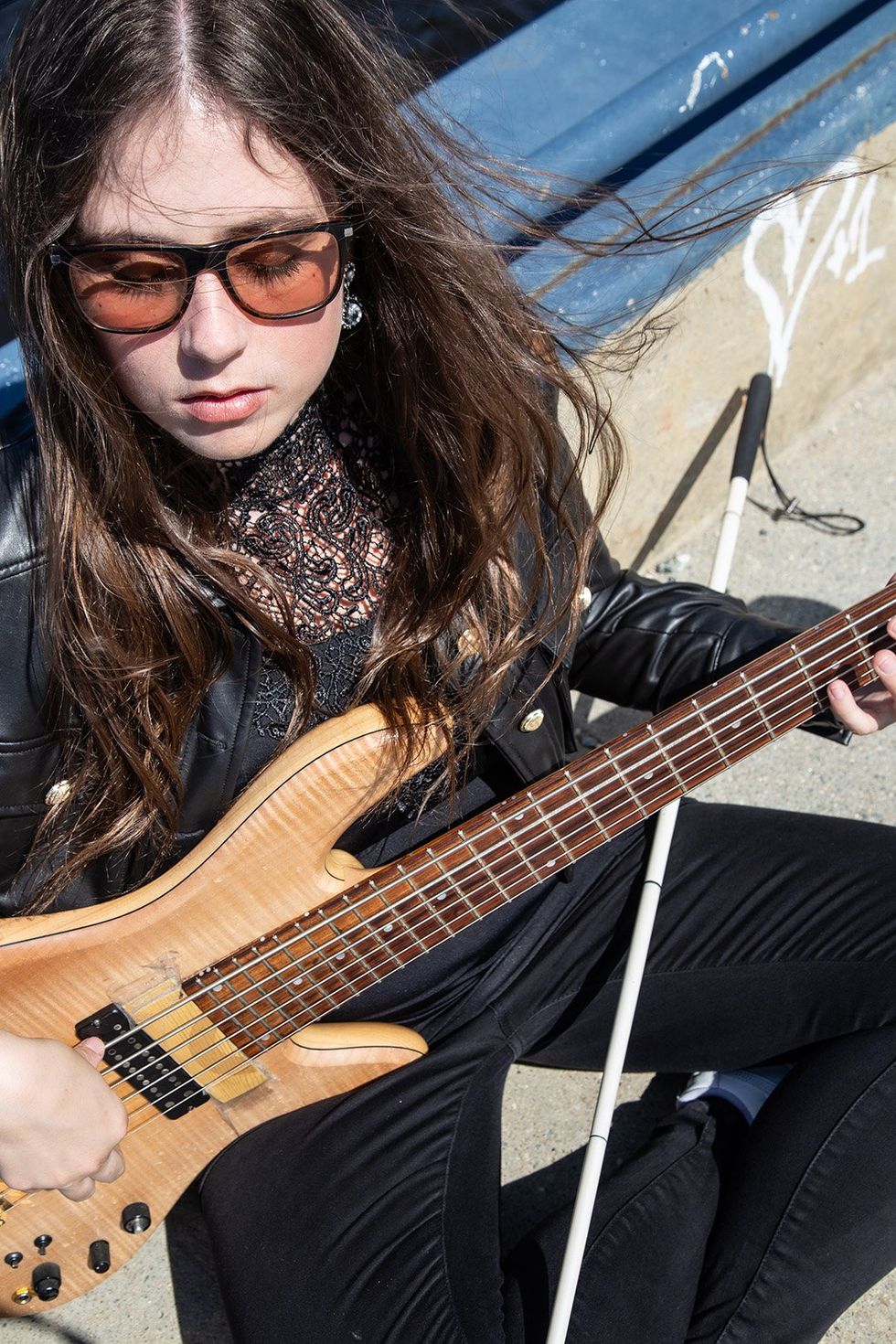
Blind. So What?, which showcases Moser’s 6-string Fodera bass, was created as part of her master's of jazz performance program at the Berklee Global Jazz Institute.
Photo by Manuela Haeussler
In high school, she started to play in more bands, and after two years, she bought a Fender American Deluxe Jazz Bass. Around that time, her instructor suggested that she enroll at Borg Linz, a pop-music-focused high school in Linz, Austria, a half hour away from her house. Classes were divided into two bands and given recording projects, where students learned how to produce music and write songs.
“There, I started to play in my first professional funk band,” says Moser. “It was called Round Corner, and the guitarist got me in a fusion trio that he started with the same drummer of the band. That was the first time I started playing more complicated music—the music of Scott Henderson, Greg Howe, Guthrie Govan, those kinds of fusion guitar players. We also played some stuff from the band Lettuce. They were actually Berklee graduates, as well.
“If it’s really important, I normally ask somebody to tell me all the knobs on the amp. But, if we don’t have time, then I just have to work with my fingers and the bass.”
“And then I went to those yearly big-band workshops where you play in a big band and you also have instrumental lessons. And there, I started to play jazz, more straight-ahead.”
Moser then started going to college in Vienna, and a year later, decided she needed “at least a 5-string.” She drove all the way to Augsburg, Germany, to a shop called Station Music. “They had like 600 basses and I tried a lot of them,” she recalls. “There was this one Fodera bass that is now my bass. I really resonated with the sound and the feel of the instrument.
“It was the overall feel of the neck that I really loved—the wood of the neck makes a lot of difference. I feel like it even makes a slight difference in the sound, because I tried some of them with dark necks and with brighter necks. But, also, what I liked about that bass was the preamp, which is cool because later, at Berklee, I studied with Mike Pope, who designed that preamp with Fodera. It’s always been striking to me how in any rehearsal room I walk into, the preamp on the bass is so well-designed that I can put the EQ of the amp flat, then just work my way around it with the bass. That’s been something that’s been supporting me as a blind person because I can’t see all the knobs on the amp. If I have a gig, or if it’s really important, I normally ask somebody to tell me all the knobs on the amp. But, if we don’t have time, then I just have to work with my fingers and the bass.”
Moser says she has yet to do any in-depth modifications or have a luthier do a custom build, but she did add a “little secret.” “I have tape on the 7th fret and on the 12th fret on the back of the neck so I can jump to wherever I want, so I can have some anchor points on the bass,” she says, adding, “I’ve been so busy performing, and I’ve been so happy with what I’ve played right now that it’s been hard to convince myself to get a different product. But I’m open to trying new instruments and defining new pathways and sounds.”
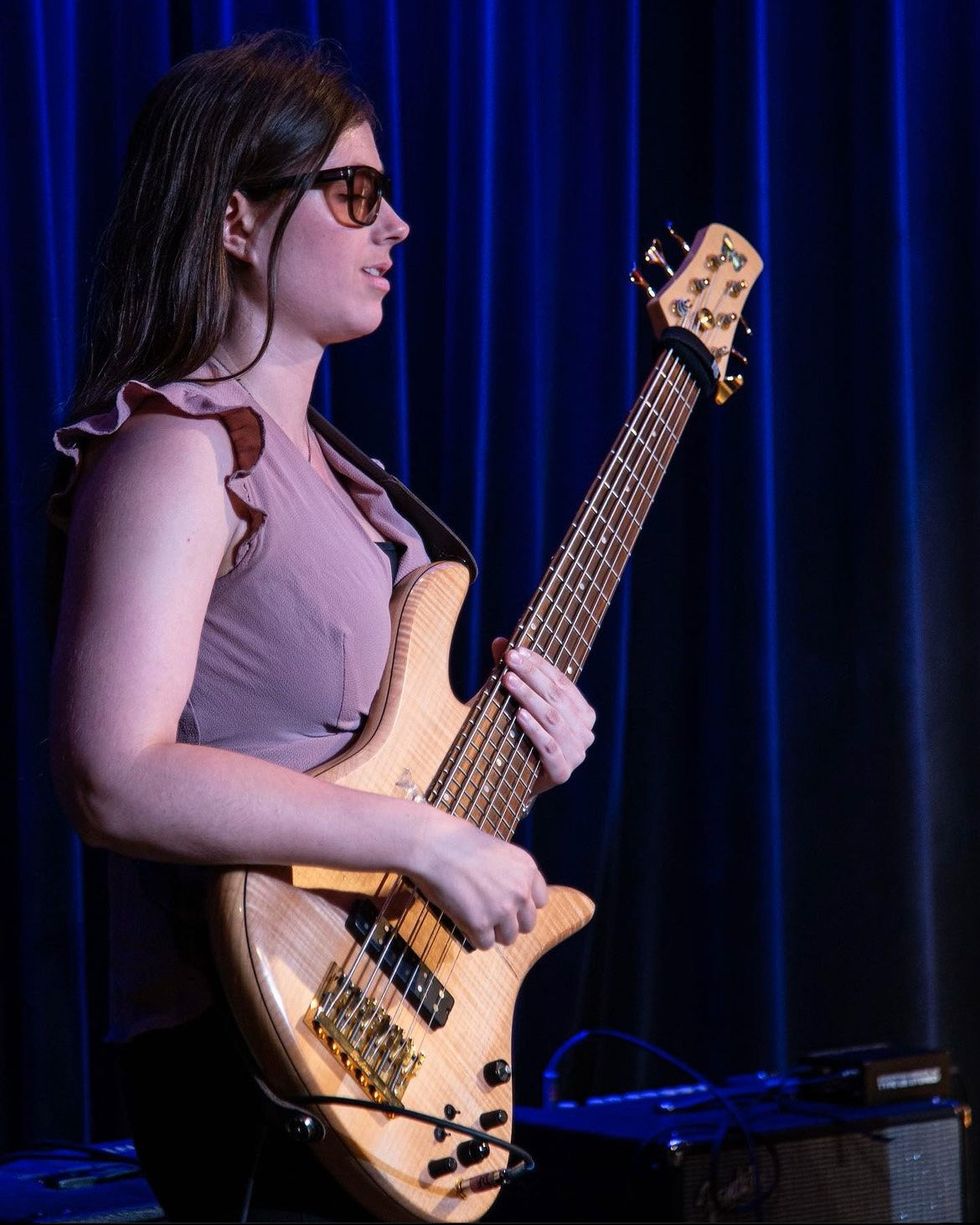
Moser is involved with Austria’s blind community, and with her experience and successes, Moser wants to help guide young blind musicians.
Photo by Manuela Haeussler
Moser, who in October finished a master’s in instrumental and vocal pedagogy from the University of Music and Performing Arts in Vienna, just did a tour of Austria at eight venues and is in the process of booking festivals and shows for this year in Europe and the U.S. She also plans on releasing an additional EP that will feature a “Different Ability” suite, “because my journey has not ended regarding that.”
“It took me a while to understand that my disability is not a disability,” she says. “I always knew my disability is a characteristic, but I still put it down a lot. I should actually put it up and highlight it, but in a good way.”
“I always knew my disability is a characteristic, but I still put it down a lot. I should actually put it up and highlight it, but in a good way.”
Moser says sighted people should not feel uncomfortable about asking questions of blind people. At least, she doesn’t mind. “They say, ‘I’m so sorry to ask you, but are you blind from birth?’ And I’m like, ‘Why are you sorry to ask me that?’ It’s as if you ask me if I have brown hair or what my size is, you know what I mean? I don’t mind talking about that. It’s part of me and it’s always gonna be. I think for them, it’s just because they’re coming from their perspective and not from my perspective,” she reasons. “So, if they would be imagining themselves blind right now, they can’t because they don’t know how it works. It’s basically ignorance, and I’m used to it. I’m used to explaining that to people every day.”
Moser is an educator herself, who often works with young people and colleagues who are blind musicians. “In Austria, I’m very involved in a blind scene, and, also at Berklee, there are always between five and eight blind students,” she explains. “I would say I’m kind of like their consultor. They always ask me questions like, ‘How did you do this?’ and ‘How do you think this could be done?’ If I meet parents of a young blind child, it’s very important for me to have that role model position and to help, because I know it’s very challenging for parents of a blind child. But for the blind child, of course, it’s challenging as well. So I definitely want to take that role.”
YouTube It
Along with a killer ensemble featuring Nishant Shekar on vocals, Ciara Moser plays live in the studio in the music video for “I Trust,” and takes a dazzling, playful solo.


